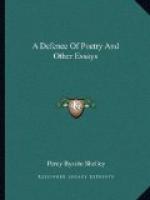One of the chief distinctions between the manners of ancient Greece and modern Europe, consisted in the regulations and the sentiments respecting sexual intercourse. Whether this difference arises from some imperfect influence of the doctrines of Jesus, who alleges the absolute and unconditional equality of all human beings, or from the institutions of chivalry, or from a certain fundamental difference of physical nature existing in the Celts, or from a combination of all or any of these causes acting on each other, is a question worthy of voluminous investigation. The fact is, that the modern Europeans have in this circumstance, and in the abolition of slavery, made an improvement the most decisive in the regulation of human society; and all the virtue and the wisdom of the Periclean age arose under other institutions, in spite of the diminution which personal slavery and the inferiority of women, recognized by law and opinion, must have produced in the delicacy, the strength, the comprehensiveness, and the accuracy of their conceptions, in moral, political, and metaphysical science, and perhaps in every other art and science.
The women, thus degraded, became such as it was expected they would become. They possessed, except with extraordinary exceptions, the habits and the qualities of slaves. They were probably not extremely beautiful; at least there was no such disproportion in the attractions of the external form between the female and male sex among the Greeks, as exists among the modern Europeans. They were certainly devoid of that moral and intellectual loveliness with which the acquisition of knowledge and the cultivation of sentiment animates, as with another life of overpowering grace, the lineaments and the gestures of every form which they inhabit. Their eyes could not have been deep and intricate from the workings of the mind, and could have entangled no heart in soul-enwoven labyrinths.
Let it not be imagined that because the Greeks were deprived of its legitimate object, they were incapable of sentimental love; and that this passion is the mere child of chivalry and the literature of modern times. This object or its archetype for ever exists in the mind, which selects among those who resemble it that which most resembles it; and instinctively fills up the interstices of the imperfect image, in the same manner as the imagination moulds and completes the shapes in clouds, or in the fire, into the resemblances of whatever form, animal, building, &c., happens to be present to it. Man is in his wildest state a social being: a certain degree of civilization and refinement ever produces the want of sympathies still more intimate and complete; and the gratification of the senses is no longer all that is sought in sexual connexion. It soon becomes a very small part of that profound and complicated sentiment, which we call love, which is rather the universal thirst for a communion not only of the senses, but of our




